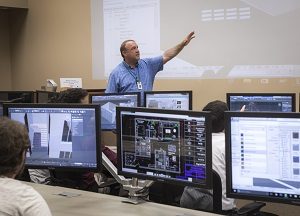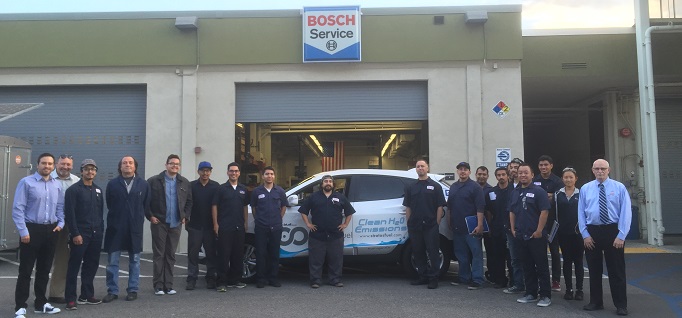The lasting impact of Mentor-Connect
By Madeline Patton
September 12, 2017
Mentor-Connect helps faculty members transform their professional experiences, and improves technician education programs and colleges’ grant-management capacity.
Grant funding from the National Science Foundation’s (NSF) Advanced Technological Education (ATE) program can transform STEM (science, technology, education and math) programs at community colleges. But getting that first ATE grant may require a little help. That’s where Mentor-Connect comes in.
Mentor-Connect provides mentoring and technical resources to help two-year college faculty prepare competitive proposals to the ATE program. It’s an ATE project that is a partnership between the South Carolina Advanced Technological Education Center at Florence-Darlington Technical College and the American Association of Community Colleges.
Faculty and staff members who have benefitted from Mentor-Connect report it offers transformational professional experiences. They’ve found its technical assistance helps improve technician education programs and colleges’ grant-management capacity.
Mentor-Connect leads to bigger and better things
John C. Frala, alternative fuels instructor and program coordinator at Rio Hondo College, said Mentor-Connect “opened up a lot of doors” that other grants he had received did not. The ATE grant proposal he prepared during 2014 with Mentor-Connect guidance was approved for $200,000 in 2015 and supported Frala’s development of curriculum for an associate of science degree in alternative fuels/second degree battery/electric/hybrid/fuel cell technology.
Seventeen students graduated from the alternative fuels vehicle program in May 2017. All the graduates were hired immediately; the four female graduates were hired by Tesla as Technician II team leaders. “It changed the lives of our students,” Frala said of the new degree program developed quickly with industry input and NSF support.
Participation in Mentor-Connect also has raised the profile of Rio Hondo College and changed Frala’s life, too. Rio Hondo was selected in 2015 as one of 15 California community colleges to test the concept of public, two-year colleges offering specific bachelor’s degrees. Rio Hondo’s bachelor of science degree is in automotive technology. In 2014, Frala became the only educator selected to serve on California Governor Jerry Brown’s 64-person Green Team of advisors. Frala received the 2016 Award for Clean Air Education and Outreach from the South Coast Air Quality Management District.
This year, Frala and Ken Mays, director of automotive technology at Central Oregon Community College and another 2014 Mentor-Connect mentee, were awarded a $778,417 ATE grant to create a standardized approach for training and certifying technicians for electric drive vehicles. Mays, the principal investigator for this new collaboration grant, was also the principal investigator of Central Oregon’s first ATE grant. It was used to create curriculum that incorporates badges with traditional credentials for technicians of hybrid electric vehicles and electric vehicles.
Augusta Tech Leverages Mentor-Connect Lessons to Obtain Other Funds
Melissa Frank-Alston, senior vice president of institutional effectiveness and research at Augusta Technical College, calls Mentor-Connect “a wonderful investment” and its impact “phenomenal.”
In 2014, when Augusta Tech submitted its Mentor-Connect application, no one at the college in Augusta, Georgia, had ever been involved in an NSF grant. Since then Frank-Alston has secured $7.8 million in external support for the college.
When the college was accepted into the 2015 Mentor-Connect cohort, Augusta Tech President Terry Elam agreed to provide release time for  Robert Collins and John Michael Weiksner Sr., and to pay for Frank-Alston, then a novice grant writer, to attend two Mentor-Connect workshops. In addition to providing a mentor to work long distance with the team during nine months, Mentor-Connect covered the travel expenses of Collins, Nuclear Engineering Technology Department chair and instructor, and Weiksner, Mechanical Engineering Technology Department chair.
Robert Collins and John Michael Weiksner Sr., and to pay for Frank-Alston, then a novice grant writer, to attend two Mentor-Connect workshops. In addition to providing a mentor to work long distance with the team during nine months, Mentor-Connect covered the travel expenses of Collins, Nuclear Engineering Technology Department chair and instructor, and Weiksner, Mechanical Engineering Technology Department chair.
Frank-Alston reports that the $198,865 ATE grant to develop curriculum for the Virtual Industrial Process Simulator Laboratory also improved relationships with the companies that employ its nuclear engineering technology graduates. Mentor-Connect also enhanced the college’s capacity to obtain grants, including a $3 million competitive Title III grant from the U.S. Department of Education, she said.
Although not every proposal that she has written since Mentor-Connect has been funded, Frank-Alston says she is a more confident grant writer thanks to Mentor-Connect’s encouragement and instruction on logic models, project budgets, and other topics. She attributes her selection for the 2017–2018 Aspen Presidential Fellowship for Community College Excellence to the professional development boost Mentor-Connect provided to her career.
2018 application available now
Colleges that have not received an ATE grant in the past seven years are eligible for Mentor-Connect. The application for the 2018 Mentor-Connect cohort is available at mentor-connect.org. Prospective applicants should view NSF ATE Program Funding Opportunities & Mentor-Connect Orientation Webinar that airs at 1 p.m. (EST) on Wednesday, September 13. Mentor-Connect applications are due October 13. Email questions to mentor-connect@fdtc.edu or call 843-676-8540.



